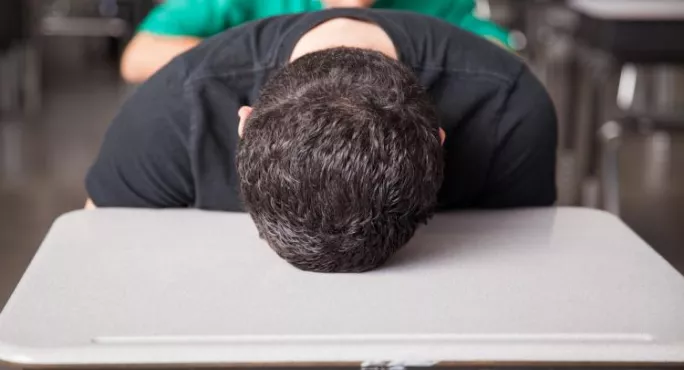- Home
- Schools should give teenagers a lie in to protect their mental health
Schools should give teenagers a lie in to protect their mental health

Staying up late is a way of life for teenagers and young adults. Whether they’re watching TV, messaging friends or playing computer games, it’s not uncommon for them to be awake until the early hours of the morning. This, of course, causes sleepiness and lack of concentration in lessons.
Yet, evidence proves that these habits have a relatively minor effect. The main cause of sleep loss for students is, in fact, early start times at schools and universities.
In adolescence and early adulthood, students need to sleep longer than adults - nine hours is recommended. This biological change is significant: as they age, students’ ideal wake and sleep times gradually become later. At university, students need to awaken later than at any other time in their lives.
School and university starting times of 8am or 9am only really suit the old and early rising headteachers and vice-chancellors. These early starts mean that, on average, students lose between 2 and 2.7 hours’ sleep a day. This average drops significantly when the start time is later, at around 10am or 11am.
As we all know, loss of sleep can affect everyone in different ways. Broadly speaking, the shift to later waking times changes with the onset of puberty, and for girls, who start puberty around 1.4 years earlier than boys, the health risks increase.
Even more worryingly, puberty and greater sleep loss occur at a critical time in brain development and contemporaneously with the onset of many mental illnesses. Jay Giedd’s research teams at the National Institute of Mental Health have been able to show that these changes in brain development are linked to the activation of genes associated with mental illnesses.
These mental health risks for female students are greater the earlier their school starts. In schools with very early starts, female students are more likely to be obese, to use legal and illegal drugs and to have lower academic performance. This combination of health-risk factors for female students is imposed on them by the conflict between the timing of their education and their biology.
It’s essential for school education to rapidly change to much later starting times to protect student health.
Clocks going forward
In the US, all middle and high schools have been told by the American Medical Association - and many other organisations - to start at 8.30am or later.
California and New Jersey have state-level legislation under discussion to force all schools to change to protect adolescence. Early starts are a global issue: in South Korea, many schools have changed their start times to become no earlier than 9am, for example. Secondary schools in the UK and the rest of Europe should start after 9am as a minimum. Even later starts can only help to safeguard students’ health, as research evidence indicates that between 10am and 10.30am is ideal for students aged 16, and 11am to 11.30am for 18-year-olds.
Universities, like schools, need to change their starting times; at age 20, males experience the greatest shift to later waking hours, and have the most to gain from later start times. Professor Russell Foster has argued strongly for the benefits of later university starts, citing enhanced cognitive capacity, memory, problem-solving and exam success as being benefits. He also argued that such starts would reduce stress, depression and psychosis. His solution would be flexitime for staff, no meetings before 10am or after 4pm, and no emails after 11pm. For students, lectures and examinations would start at 11am or later.
Professor Mariah Evans tackled university times in a different way. Bringing together neuroscientists and survey experts, she developed a new survey to assess when students were at their best for study, and optimal times for their sleep. This survey showed that a starting time of 11am or noon was ideal. Surprisingly, her team found no fixed starting time that would work well for all students.
At the Open University, we’ve developed a survey based on Evans’ work, which helps people to discover their “chronotype” and find out their best time to work and go to sleep.
Education has a duty to protect students from harm and maximise their potential. Changing to much later starting times would achieve both of these aims and improve student health.
Dr Paul Kelley is an honorary associate at the Open University and co-author of Body Clocks: the biology of time for sleep, education and work
In this week’s Tes magazine, we focus on how sleep can refresh learning. You can subscribe to Tes, here
Keep reading for just £1 per month
You've reached your limit of free articles this month. Subscribe for £1 per month for three months and get:
- Unlimited access to all Tes magazine content
- Exclusive subscriber-only stories
- Award-winning email newsletters